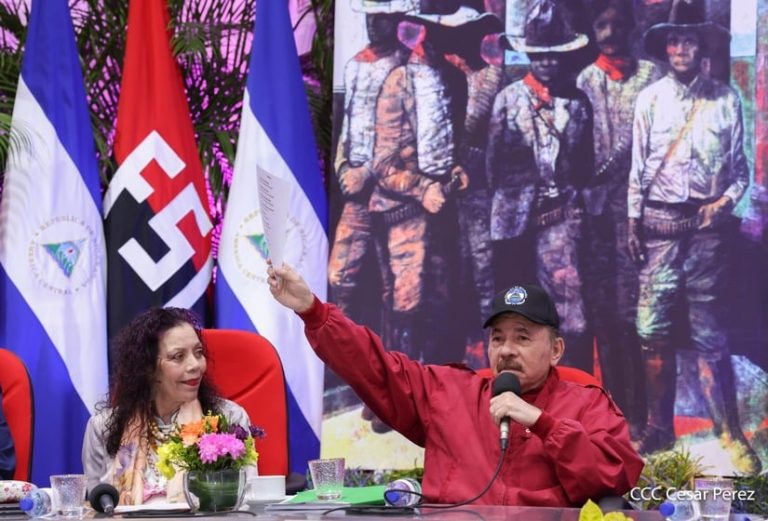5 de marzo 2024

European Concern over Lack of Academic Freedom in Nicaragua

PUBLICIDAD 1M
PUBLICIDAD 4D
PUBLICIDAD 5D
The time for tepid measures has ended. Faced with such a damning report, action must be taken with greater determination. Experts offer a roadmap

In March 2022, the United Nations Human Rights Council, appalled by the repression unleashed by the regime of Daniel Ortega and Rosario Murillo, established a Group of Experts on Human Rights in Nicaragua. Its mandate was to “investigate all alleged human rights violations and abuses” committed since April 2018, following the massive protests that shook the country.
In March 2023, the experts issued a first report. Among its many chilling revelations, it highlighted “extrajudicial executions, arbitrary detentions, torture and cruel, inhumane, or degrading treatment, arbitrary deprivation of nationality and violations of the right to remain in one’s own country, as well as the right to participate in public affairs and freedoms of expression, opinion, association, assembly, conscience, and religion.”
There was no doubt then, based on their solid work, about the perverse nature of the regime and the construction of an unprecedented repressive machinery. In view of this reality, the Council renewed the group’s tasks for two years, composed of Jean-Michael Simon, Angela María Buitrago, and Ariela Peralta Distefano, internationally recognized specialists.
Their second report, released last Thursday in Geneva, reveals an even more tragic situation: the articulation and imposition, by the Ortega-Murillo duo and their henchmen, of a meticulous machinery of control and repression typical of totalitarianism. This goes beyond open violence (used abundantly) and has managed to permeate even deeper into political and social dynamics, and in the most intimate relationships of people, including their families. It is nothing less than the cold and meticulous application of operational manuals used by the political police of the Soviet Union, East Germany, and Cuba.
Again, the UN Human Rights appointed group “was able to corroborate the information from its first report on torture and cruel, inhuman, or degrading treatment.” But it documented something more: the “violations, abuses, and crimes” have not only been perpetrated “to dismantle the efforts of active opposition, but also to eliminate critical voices and deter any long-term initiative of organization or mobilization.” In other words, it is about uprooting any possibility of opposition organizing or independent expressions, or neutralizing the sources from which they may arise. For this reason, the dictatorship has “focused on patterns of violations, inhibiting long-term any type of opposition.” This has allowed it to impose “a spiral of silence that incapacitates any potential opposition,” said Jean-Michael Simon when presenting the report.
The regime has managed to set in motion primary repression, based on silence, control, power centralization, capture or elimination of independent organizations, and victimization of the families of opponents, among many other actions. To this is added the extension of repression beyond Nicaragua, through the deprivation of nationality and legal status of hundreds of Nicaraguans, as well as the lack of access to official documentation, consular support, and other actions “that prevent family reunification and deteriorate conditions for subsistence,” in the words of Angela Buitrago.
However, the report does not stop at denunciation. It also demands action. The first conclusion suggests that Ortega, Murillo, and other senior officials be “subjected to judicial investigations for their possible responsibility” in the events. Since this will never happen in Nicaragua, it is imperative to activate the principle of universal jurisdiction so that this clique is held accountable in countries that—such as Germany, Argentina, Spain, and the United Kingdom—recognize the extraterritoriality of their judicial systems in cases of human rights violations.
The report also recommends that the international community expand sanctions against individuals and institutions involved in the violations, and use mechanisms offered by the International Financial Action Task Force, the International Monetary Fund, and Nicaragua’s preferential access conditions to markets (for example, CAFTA), to pressure the regime for a change in behavior.
The time for tepid measures has ended. Faced with such a damning report, action must be taken with greater determination. The experts offer a roadmap. It is imperative to embark on it immediately.
*Editorial published in La Nación of Costa Rica.
This article was published in Spanish in Confidencial and translated by Havana Times. To get the most relevant news from our English coverage delivered straight to your inbox, subscribe to The Dispatch.
PUBLICIDAD 3M
Diario costarricense, fundado en 1946. Su primera versión electrónica (nación.com) se publicó en abril de 1995. Desde junio de 2015 implementa un sistema de suscripción digital.
PUBLICIDAD 3D